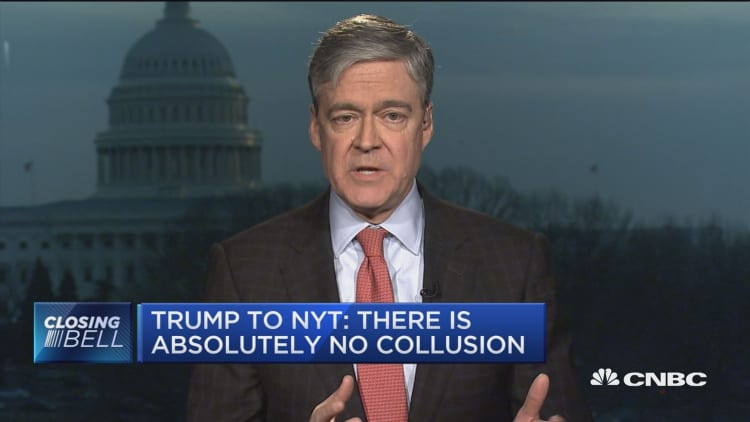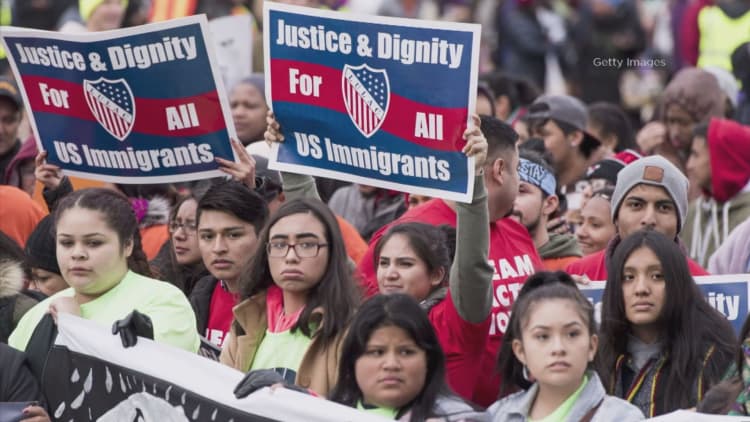President Donald Trump says so many things that are untrue as to complicate attempts at explaining them. Did he know better? Was he uninformed? Should he be taken literally?
What made the president's year-end New York Times interview notable was repetition of a particular brand of untruth. Even as his administration struggles with historic unpopularity and extraordinary dysfunction, Trump ascribes to himself qualities that surpass all predecessors – even reigning Republican icon Ronald Reagan.
Call them "delusions of omnipotence."

Over and over during the 30-minute session, Trump cast his performance in terms so grandiose and extreme as to be self-evidently false. Taken together, his comments signaled an inability to grasp conditions in the country, the limitations of his own capacities and the nature of the office he holds.
Here are some examples:
– He attributed his 2016 victory over Hillary Clinton to skill in overcoming the pro-Democratic tilt of the Electoral College. There is no such tilt. The electoral college system provides a path to victory for the party losing the popular vote. Republicans lost six of the last seven popular votes in presidential contests, but they won the Electoral College in two of those six instances.
– He insisted his Democratic adversaries on Capitol Hill have absolved him of "collusion" with Russia on election interference. They have not. They have said they haven't yet seen conclusive evidence from Congressional and Justice Department investigations that remain ongoing.
– He declared, "I have absolute right to do what I want with the Justice Department." He does not. He holds executive branch authority over the Justice Department, but under America's constitutional system, executive power is not absolute and no one is above the law.
– He claimed, in deriding the effectiveness of West Virginia's Democratic Sen. Joe Manchin, that "I'm the one that saved coal." He has not. For economic and environmental reasons, coal remains a declining industry.
– He claimed extraordinary influence over Congress, where Republican lawmakers "love me." Republican lawmakers generally do not love him, though many fear his ability to turn rank-and-file voters against them. Some treat him with undisguised contempt. His attempt to "repeal and replace" Obamacare, for which he claimed to have won over 100 resistant GOP members, failed.
– He claimed understanding of public policy superior to any president in American history. "I know the details of taxes … better than the greatest CPA," and of health care "better than most." He does not, as he proved moments later by asserting "millions of people are joining" a type of health plan he created. No one has; his directive on the subject has not been implemented.
– He said Chinese President Xi Jinping "likes me" and "has treated me better than anybody's ever been treated in the history of China." But Xi, as Trump subsequently acknowledged, has not acceded to his requests on North Korea policy.
– He asserted "I knew what I was doing" in the Alabama Senate race, and that "I didn't lose" because his endorsement lifted the fortunes of two different Republican candidates. He lost twice – backing different candidates who failed in the Republican primary and then the general election.
– He claimed "my base is stronger than it's ever been" in backing him. It is not. Trump began his presidency with the approval of 45 percent of Americans in the Gallup Poll. His approval now stands below 40 percent – and has for seven consecutive months.
Trump is the least-popular first-year president in the history of polling. As shown in this fall's Alabama and Virginia elections, he has helped drive down Republican support among college-educated suburban voters, especially women.
Like many supporters, the president frequently ascribes political difficulty to "fake news" from hostile reporters. That itself undercuts his claim of unique ability to command the outcome in a 2020 re-election contest, which provides the final example:
– "I'm going to win another four years," Trump declared, "because newspapers, television, all forms of media will tank if I'm not there. Because without me, their ratings are going down the tubes."
WATCH: Trump says no DACA deal without border wall



